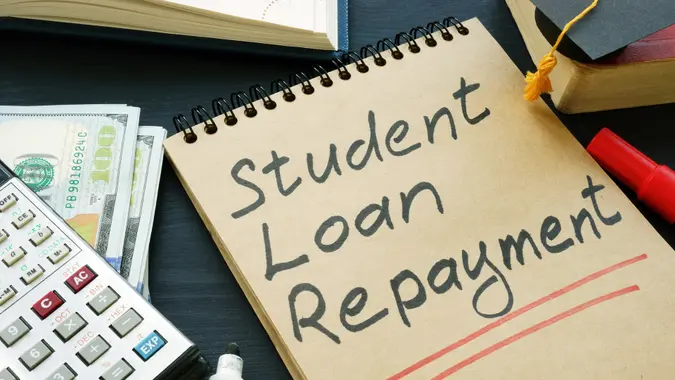Why Dave Ramsey Advises Against Student Loan Income-Driven Repayment Plans

Commitment to Our Readers
GOBankingRates' editorial team is committed to bringing you unbiased reviews and information. We use data-driven methodologies to evaluate financial products and services - our reviews and ratings are not influenced by advertisers. You can read more about our editorial guidelines and our products and services review methodology.

20 Years
Helping You Live Richer

Reviewed
by Experts

Trusted by
Millions of Readers
Personal finance pros often hail income-driven repayment (IDR) plans as an excellent option for dealing with student loan debt. One particularly well-known expert isn’t convinced, though.
Jaspreet Singh on the 75/15/10 Rule: This Is How the 1% Manage Their WealthFind Out: 6 Steps To Take To Become a Millionaire by 30
Celebrity money guru Dave Ramsey understands why students are drawn to the lure of IDR plans, but cautions his audience that they can keep you poor — and paying for decades.
Why Borrowers Flock to IDR Plans
There are four types of IDR plans, all of which are available only to borrowers with federally backed loans: income-based repayment (IBR), pay as you earn (PAYE), income-contingent repayment (ICR) and saving on a valuable education (SAVE).
The allure of these plans is not lost on Ramsey, who outlined the appeal they have for struggling borrowers on his Ramsey Solutions blog:
- Lower payments: IDR plans calculate monthly payments based on your income and expenses. They’re typically 10%-15% of your discretionary income, which is the difference between your income and the poverty rate for your family size.
- More time to pay: IDR plans stretch your loan from the standard 10-year term to 20 or 25 years.
- Eventual cancelation: After the 20- or 25-year term is up, any remaining balance can be forgiven.
Dangers of Tying Debt to Time and Income
The promise of more time and lower payments is a tempting proposition, but Ramsey cautions his audience to look past the upside.
“Although these plans get promoted as a super-package that boosts your budget today and forgives your student loans tomorrow, they can actually keep you in debt years longer than necessary,” he wrote on Ramsey Solutions. “And forgiveness through income-driven repayment plans can take decades (if it happens at all)!”
Protracted Terms Are More Expensive and Keep You in Debt Longer
The first pitfall is the math associated with extended loan terms, which is all too familiar to anyone who stretched out their auto payments to buy a car they couldn’t truly afford. More payments means more interest paid to the bank, even if those payments are smaller.
“Smaller payments and growing interest add up to long-lasting debt,” Ramsey wrote. “It makes zero sense if your goal is to get out of debt and build wealth.”
IDR Plans Incentivize Low Earnings and Drawn-Out Debt
With IDR plans, manageable payments are contingent upon a modest income, which gives borrowers an incentive to keep their earnings low enough to qualify. Climbing the professional ladder could trigger a return to higher student loan payments — but Ramsey thinks that’s a good thing.
“Keep in mind that both your debt size and income can — and should — change over time,” he wrote. “As your income increases, your debt should steadily disappear. IDR plans tend to do the opposite. They lock people into a pattern of low income and zero progress on debt — and in most cases, your debt grows! That combo will only slow down your dreams of financial peace.”
IDR Plans Often Break the Promise of Eventual Forgiveness
The third and strongest enticement of IDR plans is the prospect of one day seeing your remaining debt canceled. However, that can only happen after decades of debt that is guaranteed to follow even the youngest borrowers into middle age.
Ramsey wrote, “That length of time should already be a red flag that this is a very expensive form of forgiveness! It’s like getting your hopes up that if you’ll just agree to live in a shack for a couple of decades, there will be a modest brick ranch waiting for you as a reward on the other side.”
The leftover amount that qualifies for forgiveness will likely pale in comparison to the mountains of extra interest you pay over the years and the income you might have earned if you made too much money to qualify — if it’s forgiven at all.
“Forgiveness through income-driven repayment is not guaranteed,” Ramsey wrote before outlining the many catches that apply to all four types of IDR plans.
Consider the Alternatives
While IDR plans might be right for some borrowers, Ramsey believes they are a trap for most. Instead, he wants borrowers to manage their burdensome student debt with the following strategies:
- Live according to a budget: Ramsey calls the act of creating a budget a “life-changing” experience that can scrub the fear and anxiety from even the most daunting student debt. Assign a purpose to every dollar coming in and stick to a strict spending plan to eliminate your college loans faster and cheaper than you would with an IDR plan.
- Boost your income: Decades of low pay are one of the prerequisites for completing an IDR plan. Ramsey wrote, “You don’t want to be locked into a low-paying job for the next 20 years, do you? Nope! Your best bet is to increase your income — so you have more money to throw at your student loans and more money to put toward your other goals.”
- Use the debt snowball method: Unlike IDR plans, Ramsey calls his favorite debt-reduction strategy, the snowball method, “your game plan for tackling debt and getting your life back.” Pay as much as you can toward your smallest debt, irrespective of interest rates, while making the minimum payment on the rest. When that debt is gone, move on to your next smallest obligation and repeat the process until you’re free and clear.
 Written by
Written by  Edited by
Edited by 

























